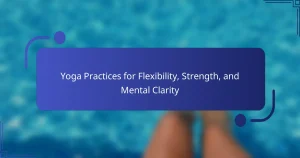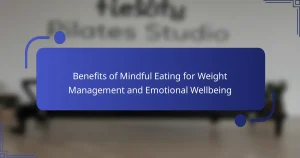Sleep technology enhances rest and recovery by improving sleep quality and tracking patterns. It includes smart mattresses that adjust for comfort, sleep trackers measuring vital metrics, and apps offering relaxation techniques. Users can personalize their sleep experience while addressing challenges like device accuracy and data interpretation. Emerging trends focus on advanced analytics and integration with smart home systems for optimized sleep environments.
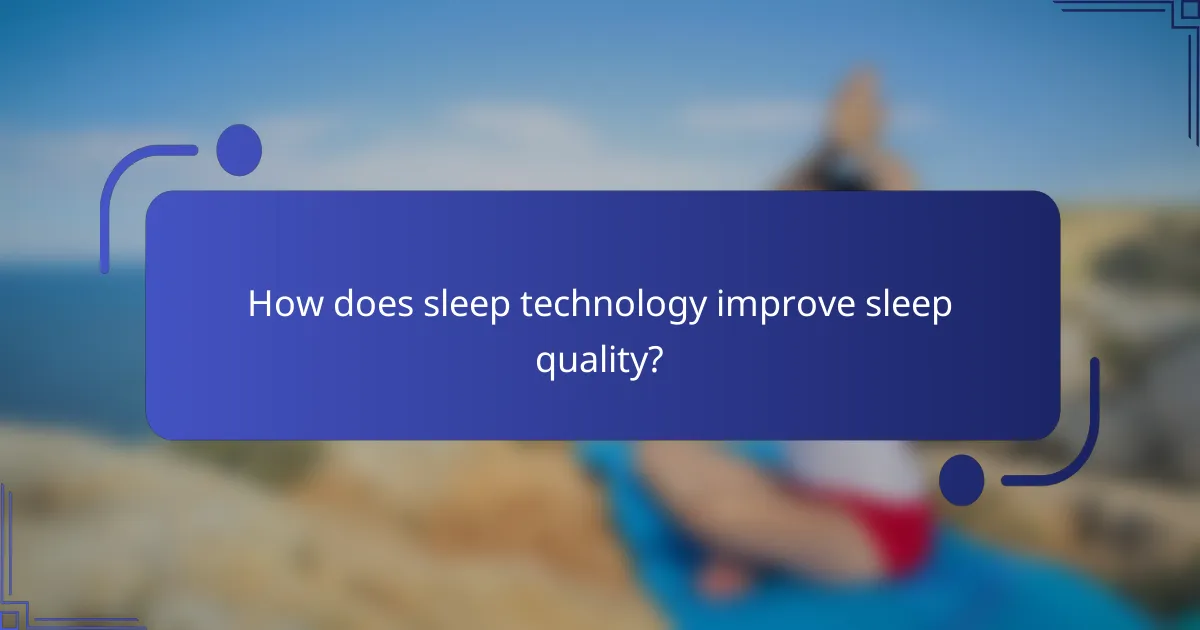
How does sleep technology improve sleep quality?
Sleep technology significantly enhances sleep quality through advanced monitoring and personalized features. Devices like smart mattresses and sleep trackers analyze sleep patterns, providing insights for better rest. For example, these technologies can adjust temperature and firmness based on user preferences, optimizing comfort. Moreover, sleep apps offer guided meditations and soundscapes that promote relaxation, helping users fall asleep faster. As a result, individuals experience improved sleep duration and overall recovery, leading to better health outcomes.
What are the key features of sleep tracking devices?
Sleep tracking devices monitor and analyze sleep patterns to improve rest quality. Key features include heart rate monitoring, sleep stage analysis, movement tracking, and integration with health apps. These attributes help users understand sleep quality and make adjustments for better recovery. Advanced models may also offer unique features like sleep environment assessment or personalized sleep coaching.
Which sleep technology solutions are most popular in 2025?
The most popular sleep technology solutions in 2025 include smart mattresses, sleep trackers, and white noise machines. Smart mattresses adjust firmness and temperature, enhancing comfort during sleep. Sleep trackers monitor sleep patterns, providing insights for better rest. White noise machines create soothing sounds, promoting uninterrupted sleep. Each solution targets specific sleep challenges, improving overall recovery and well-being.
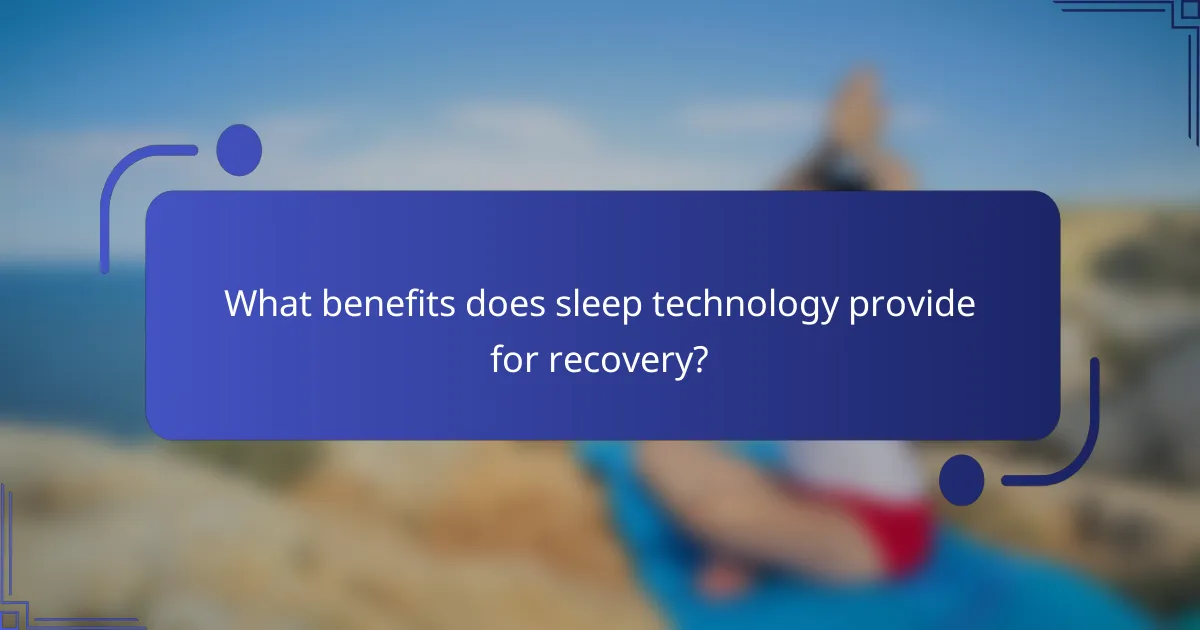
What benefits does sleep technology provide for recovery?
Sleep technology significantly enhances recovery by improving sleep quality, tracking sleep patterns, and facilitating better rest. These devices provide insights into sleep stages, helping users optimize their routines. For example, smart mattresses adjust firmness based on sleep position, promoting comfort. Sleep trackers measure metrics like heart rate and breathing, offering data that can lead to healthier habits. Overall, sleep technology supports physical and mental recovery through personalized insights and adjustments.
How does sleep technology enhance athletic performance?
Sleep technology significantly enhances athletic performance by optimizing rest and recovery. Devices like sleep trackers and smart mattresses provide insights into sleep patterns, allowing athletes to adjust their routines for better recovery.
Advanced metrics such as sleep quality and duration can directly impact performance levels. For instance, research indicates that improved sleep can lead to a 20% increase in athletic performance.
Furthermore, sleep technology can help identify sleep disturbances, enabling athletes to address issues that may hinder recovery. This proactive approach ensures athletes maintain peak physical condition and reduce the risk of injury.
In summary, the integration of sleep technology into training regimens empowers athletes to maximize their rest, leading to enhanced performance outcomes.
Which sleep tech innovations are designed for stress reduction?
Sleep technology innovations designed for stress reduction include smart mattresses, sleep trackers, white noise machines, and meditation apps. These devices enhance relaxation and improve sleep quality.
Smart mattresses adjust firmness and temperature based on user preferences, promoting comfort. Sleep trackers monitor sleep patterns and provide insights, helping users identify stressors. White noise machines create soothing sounds that mask disruptive noises, fostering a peaceful environment. Meditation apps guide users through relaxation techniques, reducing anxiety and enhancing mental well-being.
These innovations collectively contribute to a better sleep experience, addressing both physical and mental stressors effectively.
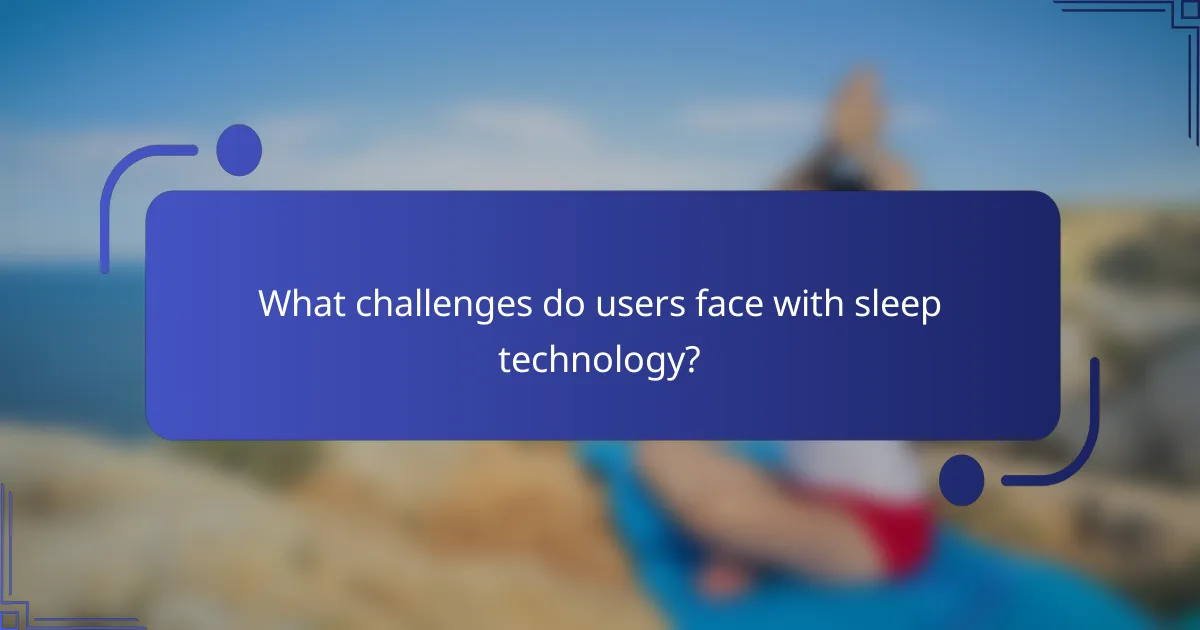
What challenges do users face with sleep technology?
Users face several challenges with sleep technology, including device accuracy, comfort, and data interpretation. Many devices struggle to provide precise sleep stage tracking, leading to misinformation. Comfort is another concern, as some wearables can be cumbersome during sleep. Users often find it difficult to interpret the data collected, which can lead to confusion about their sleep quality. Additionally, privacy issues arise, as users may be hesitant to share sensitive health data with manufacturers.
How can users overcome common issues with sleep devices?
Users can overcome common issues with sleep devices by ensuring proper setup, regular maintenance, and understanding features.
Many sleep devices require calibration to function optimally. Users should follow the manufacturer’s guidelines for setup. Regular updates and maintenance can prevent software glitches. Understanding features like sleep tracking can help users interpret data effectively.
Additionally, users should create a conducive sleep environment by minimizing distractions. This ensures that the device can accurately monitor sleep patterns without interference.
Lastly, consulting user forums or manufacturer support can provide insights into troubleshooting common problems.
What limitations do current sleep technologies have?
Current sleep technologies face several limitations that hinder their effectiveness. They often lack personalization, failing to adapt to individual sleep patterns and preferences. Many devices rely on generalized data, which can lead to inaccurate assessments. Additionally, some technologies do not integrate well with other health metrics, limiting a comprehensive view of overall well-being. Battery life and durability are also common concerns, as many devices require frequent charging or are not built for long-term use. Finally, privacy issues arise from the collection and storage of sensitive sleep data, which can deter users from fully embracing these technologies.
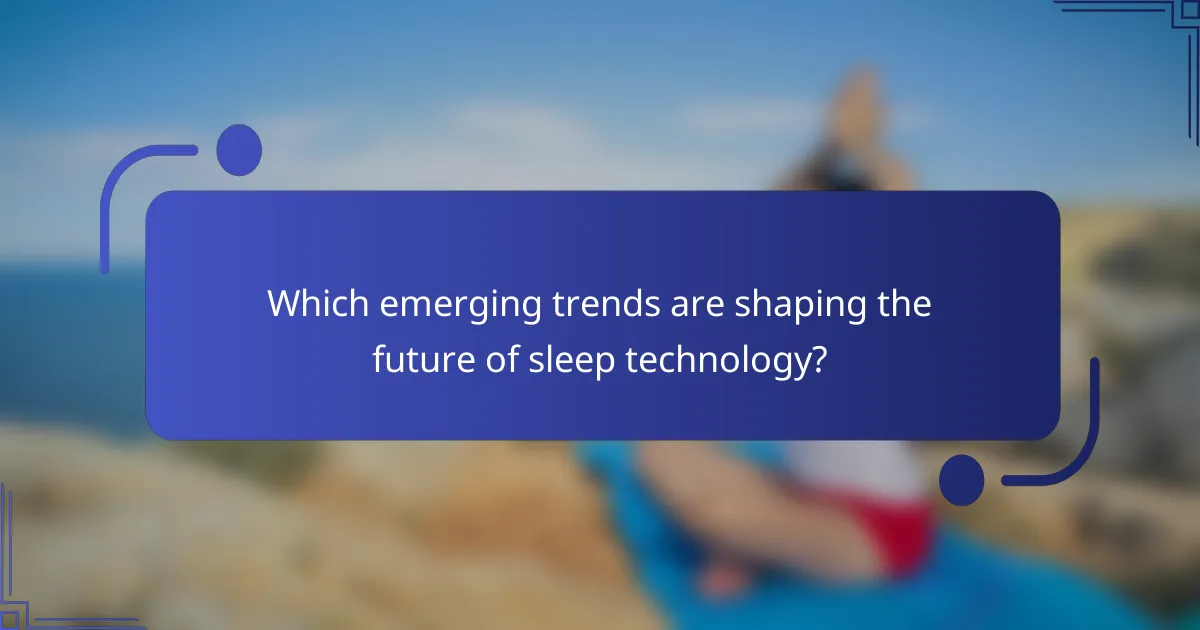
Which emerging trends are shaping the future of sleep technology?
Emerging trends in sleep technology focus on personalization, data analytics, and integration with smart home systems. Personalized sleep solutions analyze individual sleep patterns to optimize rest. Advanced data analytics provide insights into sleep quality and health metrics. Integration with smart home devices enhances the sleep environment, promoting better recovery.
How is artificial intelligence being integrated into sleep tech?
Artificial intelligence is revolutionizing sleep technology by enhancing personalized sleep solutions. AI algorithms analyze sleep patterns, providing tailored recommendations for improving rest quality. Smart devices equipped with AI can adjust environmental factors, such as light and temperature, to optimize sleep conditions. Additionally, AI-powered sleep trackers offer insights into sleep stages and disturbances, helping users understand their sleep health better.
What role do wearables play in sleep technology advancements?
Wearables significantly enhance sleep technology by providing real-time data on sleep patterns and quality. They track metrics such as heart rate, movement, and sleep stages, offering insights that promote better sleep hygiene. For instance, devices can suggest optimal sleep schedules based on individual patterns, helping users to maximize restorative sleep. Additionally, advanced wearables utilize algorithms to analyze data, providing personalized recommendations that improve overall sleep health. This integration of technology and personalized feedback represents a unique advancement in the pursuit of enhanced rest and recovery.
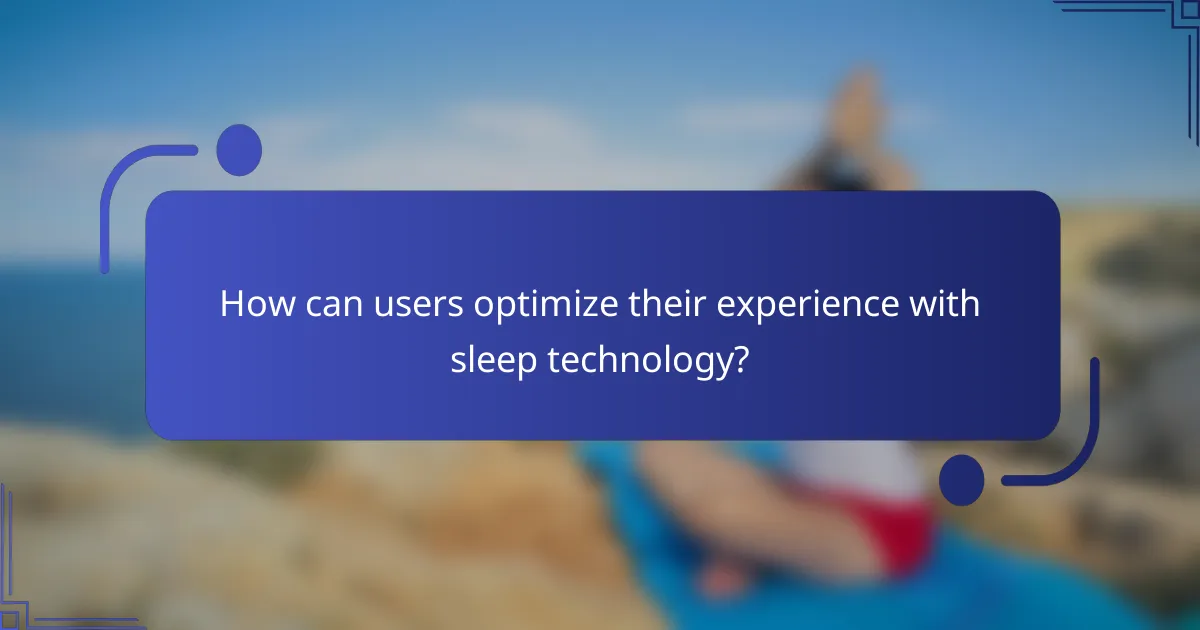
How can users optimize their experience with sleep technology?
Users can optimize their experience with sleep technology by selecting devices that align with their specific sleep needs. High-quality sleep trackers provide insights into sleep patterns, while smart mattresses adjust firmness based on body pressure.
Utilizing apps that promote relaxation techniques can enhance sleep quality. For example, guided meditation and sleep sounds may help users fall asleep faster. Regularly reviewing sleep data enables users to identify trends and make necessary adjustments.
Incorporating light therapy devices can improve circadian rhythms, especially for those struggling with seasonal affective disorder. Lastly, maintaining a consistent sleep schedule complements the use of technology, maximizing overall benefits.
What best practices should users follow for effective sleep tracking?
To effectively track sleep, users should prioritize consistency, use reliable technology, and analyze data regularly. Maintaining a regular sleep schedule enhances data accuracy. Utilize devices that measure sleep stages for comprehensive insights. Regularly review sleep patterns to identify trends and make adjustments for better rest.
Which common mistakes do users make when using sleep technology?
Users commonly make mistakes such as neglecting to calibrate devices, relying solely on technology without addressing sleep hygiene, and misunderstanding data interpretation. These errors can undermine the effectiveness of sleep technology in enhancing rest and recovery.
Many users fail to adjust settings according to their unique sleep patterns, leading to inaccurate assessments. Additionally, overlooking environmental factors, like light and noise, diminishes the potential benefits of sleep technology. Misinterpreting metrics can also result in misguided conclusions about sleep quality, further complicating recovery efforts.

